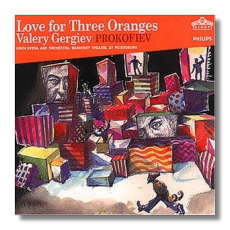
The Internet's Premier Classical Music Source
Related Links
- Prokofieff Reviews
- Latest Reviews
- More Reviews
-
By Composer
-
Collections
DVD & Blu-ray
Books
Concert Reviews
Articles/Interviews
Software
Audio
Search Amazon
Recommended Links
Site News
 CD Review
CD Review
Serge Prokofieff

Love for Three Oranges
- Mikhail Kit (King of Clubs)
- Evgeny Akimov (Prince)
- Larissa Diadkova (Clarissa)
- Alexander Morozov (Leander)
- Konstantin Pluzhnikov (Truffaldino)
- Vassily Gerello (Pantaloon)
- Vladimir Vaneev (Chelio)
- Larissa Shevchenko (Fata Morgana)
- Anna Netrebko (Ninetta)
- Grigory Karasev (Cook)
Kirov Chorus and Orchestra/Valery Gergiev
Philips 462913-2 DDD 2CDs: 50:08, 51:50
Paradoxically, although some of Prokofieff's most popular music is contained in this opera (thanks to the orchestral suite, and the tremendously popular March in particular), it has not seen much activity in the recording studios. About a decade has passed since Love for Three Oranges was last recorded, and even longer since it was recorded in Russian. It is one of the last operas to be released in Philips's series of Prokofieff operas performed by the Maryinsky Theatre's Kirov forces. (Only the juvenile Maddalena remains.)
This opera is often described as a surreal farce. That description isn't inaccurate, but it is good to remember that Prokofieff was out to scandalize tradition-minded audiences with this score. Opera, as most of them knew it, with its arias, love duets, and noble emotions, did not interest the composer. It might not be going too far to say that he wanted to leave an "off" taste in their mouths. So, while Love for Three Oranges is a comical work, its satire doesn't just remain within the proscenium arch; it reaches out over the orchestra pit and gives an electric shock to the good people in evening clothes.
The previous recording (on Virgin Classics) of this opera was sung in French by personnel from the Lyon Opéra. That was completely valid, because, in fact, Prokofieff (who also wrote the libretto) prepared the French text, and that's how the opera was performed when it received its premières in Chicago and New York. This new recording is sung in Russian. That there is a difference, musically speaking, between the two languages is immediately obvious. It might sound like a cliché, but when Love for Three Oranges is sung in French, lightness and wittiness rise to the top. When it is sung in Russian, dark forces make their presence known. Gergiev and his Kirov team, then, present a more menacing Love for Three Oranges than Nagano and the Lyonnaise. I don't think that Prokofieff would have faulted them for this. It really comes down to how one conceives of this score in the first place. If one expects farce and good times, Nagano is the first choice. (This set, however, is no longer available in the United States). If one is tempted to delve into the psychological (and political?) meaning of the stage action, then Gergiev must be considered.
This is a true ensemble opera, so there is little point in highlighting specific singers. Suffice it to say that the cast list contains familiar names from earlier Kirov recordings, and it is intriguing to hear how versatile – and excellent – these singers are. There are no bad performances here. In terms of vocal quality, some might prefer the French cast for its smoother voices. Still, this is not Lucia di Lammermoor, and I don't think one listens to Love for Three Oranges in search of bel canto. Gergiev conducts with plenty of vigor, and while he finds the music's weight, he doesn't add unwanted heaviness of his own. The other peril – rushing the score off its feet – is avoided as well.
This recording was made in the Concertgebouw in Amsterdam in front of an audience. We can hear them from time to time, but mostly at the end of CD sides, where applause has been retained. I assume that this was a concert performance, because I don't hear any stage action. The sound is more resonant than I would like it to be, but this is not really a big problem. The libretto contains an essay, a synopsis, and texts in English and transliterated Russian.
Give this recording a try if you are curious about the music that surrounds the ever-present March!
Copyright © 2001, Raymond Tuttle


















